Our Top 9 Japanese Manga Recommendations || Beginner to Advanced Level Japanese
Want to Read Japanese Manga IN Japanese? 📖 Here’s Where to Start…
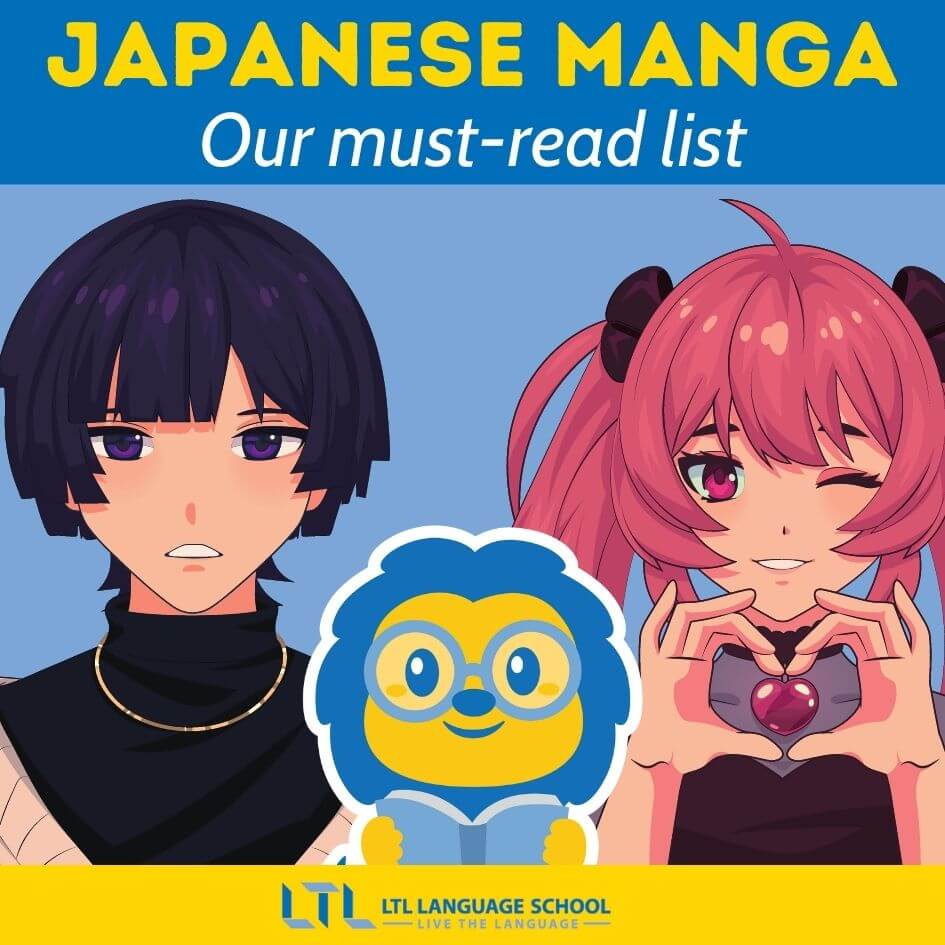
Want to read manga in Japanese?
Want to practice your kanji, vocabulary, grammar, and reading skills in an accessible, fun way?
Or maybe you just want to know more about LTL’s awesome manga recommendations!
Whichever it is, you’re in the right place.
Today’s post will cover 9 manga recommendations, from the beginner to the advanced level in Japanese.
So what do we recommend you read? Let’s go see…
Japanese Manga | 放課後、恋した。/ I Fell in Love After School (Beginner)
Japanese Manga | 可愛いだけじゃない式守さん / Shikimori-san Isn’t Just a Cutie (Beginner)
Japanese Manga | ふらいんぐうぃっち / Flying Witch (Beginner)
Japanese Manga | ホリミヤ / Horimiya (Intermediate)
Japanese Manga | 夏目友人帳 / Natsume’s Book of Friends (Intermediate)
Japanese Manga | 極主夫道 / The Way of the Househusband (Intermediate)
Japanese Manga | 銀の匙 / Silver Spoon (Advanced)
Japanese Manga |【推しの子】/ Oshi no Ko (Advanced)
Japanese Manga | キングダム / Kingdom (Advanced)
Japanese Manga | FAQs
Beginner Japanese Manga // 放課後、恋した。(I Fell in Love After School)
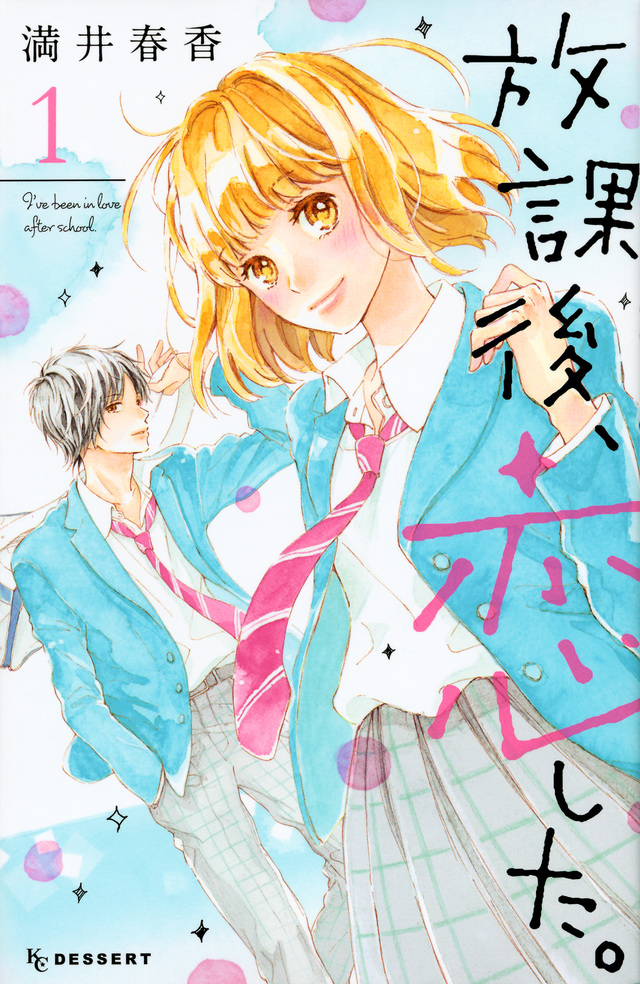
As a beginner to Japanese, romance manga is often the best choice, since it uses simple vocabulary that’s centered around daily life and romantic relationships.
I Fell in Love After School is a cute, easy manga that follows its protagonist, 15-year old Kao, as she enters high school and becomes the manager of the boy’s volleyball team.
Her older brother, a teacher at the school who’s also the team’s coach, asks her to recruit another new student, Kuse Nazaki, as the team’s ace.
In the process, they begin to fall in love. The manga follows their daily lives and interactions, mainly in the school setting.
Not only is the vocabulary used centered around the school setting, the grammar is also very simple and accessible for learners at the N4 (upper beginner) level of Japanese.
Finally, the art is pretty and the story and characters are very cute, which adds to the charm of 放課後、恋した。(We Fell in Love After School). The series has 8 volumes and is completed.
Beginner Japanese Manga // 可愛いだけじゃない式守さん (Shikimori-san Isn’t Just a Cutie)
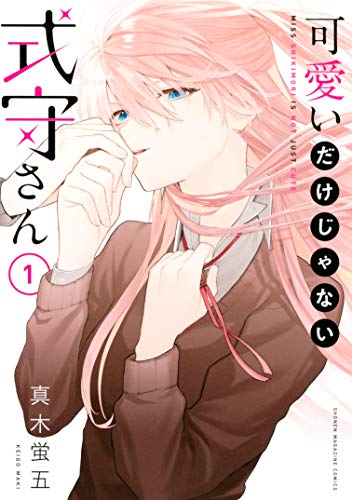
Similar to I Fell in Love After School, Shikimori-san Isn’t Just a Cutie is a high school romance manga. It has 20 volumes and is completed.
However, rather than sports, it follows the daily lives of a couple: Shikimori-san, the super cool (and, as in the title, very cute) girlfriend of Izumi-kun, her sweet but clumsy and accident-prone boyfriend.
The manga is narrated by Izumi-kun, and the format of each chapter is repetitive, making the story easy to follow.
Plus it doesn’t hurt that the art is very pretty!
Finally, this manga is so popular that there’s even an anime adaptation! If you enjoy it, it’s absolutely worth checking out for some listening practice!
Beginner Japanese Manga // ふらいんぐうぃっち (Flying Witch)
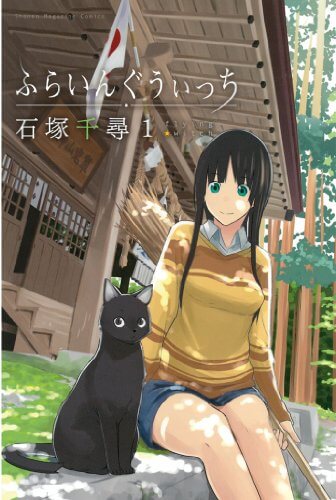
Flying Witch, like Shikimori-san Isn’t Just a Cutie, is also a very popular manga with an anime adaptation. Unlike the first two manga in this list, it is not a romance.
Flying Witch is a slice of life fantasy manga following 16-year old Makoto, who leaves her hometown to go live with her extended family in the countryside. The catch is that she’s left home to complete her witch training!
The manga follows Makoto’s adventures, from meeting other witches and messing up potion making to learning to farm and making new friends at school.
If you’re a cat lover, it’s the perfect manga for you! 🐱
Makoto’s cat, Chito, is adorable and smart. Sometimes the manga follows him on his own adventures!
This is a perfect manga for beginners, as it uses lots of casual, everyday language and has a fun, engaging storyline and characters. It’s dialogue heavy as well, making it a quick read. Flying Witch has 12 volumes and is ongoing.
DID YOU KNOW || We also have a guide on Chinese Manga.
Intermediate Japanese Manga // ホリミヤ (Horimiya)
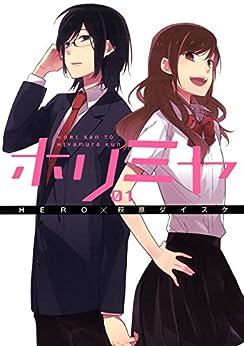
A portmanteau of the two main characters’ names, Horimiya follows the lives of high schoolers Hori Kyōko and Miyamura Izumi.
In this popular manga (it also has an anime adaptation), the two main characters lead double lives.
At school, Hori is popular, stylish, smart, and outgoing.
At home, she’s a total homebody who spends most of her time looking after her little brother instead of out at karaoke with her friends.
Miyamura’s tattoos, piercings, and fantastic hair style display his individuality, which goes against many Japanese social norms – not to mention the school dress code! But at school, he hides it all and wears his hair down, along with glasses and long sleeves even in the summertime. This makes people perceive him as a gloomy loner.
When Miyamura and Hori accidentally discover the sides of one another outside of the sides that they both show at school, they form a unique relationship.
This manga is perfect for intermediate learners who are ready to challenge themselves with slang and more complicated grammar. For example, at times the characters use incomplete words or sentences that the reader has to guess the meaning of depending on the context of the story.
Horimiya has 16 volumes and is completed.

Japanese TV Shows (On Netflix) 📺 Ten TV Shows To Binge On
Today you are going to discover the best Japanese TV Shows you need to watch now. Every single one of these is available on Netflix for you to enjoy!
Intermediate Japanese Manga // 夏目友人帳 (Natsume’s Book of Friends)
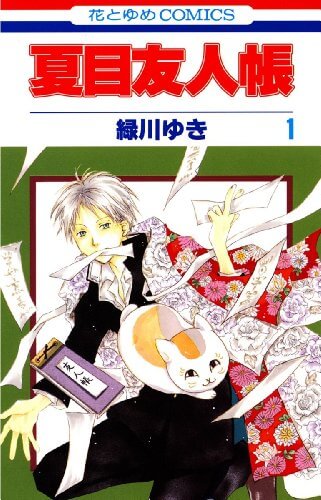
Natsume’s Book of Friends is a fantasy manga about a boy named Natsume, who has the ability to see Japanese supernatural creatures called yōkai.
These creatures manifest as various types of monsters and spirits, such as the cat-like yōkai on the cover of volume 1 (left).
Natsume, an orphan, moves in with distant relatives and inherits a box of his late grandmother’s things.
His grandmother could also see yōkai, and even fought with and made friends them.
Natsume inherits a book from her which has the name of a different yōkai written on each page, which bound them to his grandmother.
Natsume is tasked with returning each of the names to the various yōkai they belong to. The manga follows his journey to return each of the names, which is both dangerous and poignant.
This manga is excellent for intermediate learners who want a challenge. Like the other manga in this list, it has furigana, uses N4 grammar, and has an interesting, engaging plot.
However, Natsume’s Book of Friends also has references to various yōkai, which allows the reader to learn more about Japanese folklore and cultural beliefs.
Natsume’s Book of Friends has 29 volumes and is ongoing.
Intermediate Japanese Manga // 極主夫道 (The Way of the Househusband)
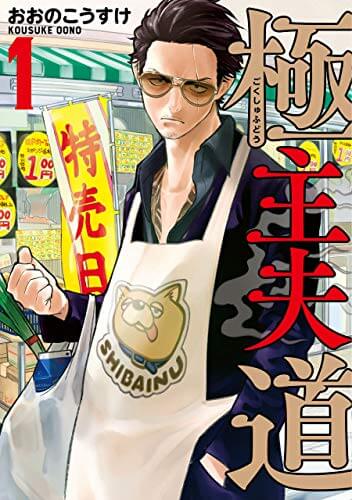
The Way of the Househusband is an absolutely hilarious manga about an ex-yakuza who gets married and becomes a househusband.
The manga follows Tatsu, formerly known as “the Immortal Dragon” of the yakuza underworld, as he makes dinner for his career woman wife, cleans their apartment, and goes grocery shopping… all while looking positively terrifying!
The manga’s comedy comes from the gap between his benign actions and his imposing aura, along with various interactions between Tatsu and his wife, his neighbors, and his former yakuza friends and enemies.
The manga is very text-light, with entire pages filled with images and no dialogue. The dialogue that does appear is often in the form of jokes and yakuza slang. It’s very fun to search up the words and expressions used and understand the jokes!
The Way of the Househusband has 12 volumes and is ongoing.
Advanced Japanese Manga // 銀の匙 (Silver Spoon)
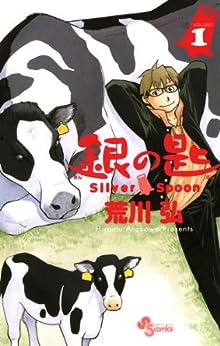
Silver Spoon may be a high school manga… but it’s set in an entirely different type of high school than everything else on the list!
Silver Spoon takes place at an agricultural high school in rural Hokkaido, far away from the usual urban Tokyo setting of most manga.
The main character, city boy Hachiken Yuugo, decides to attend an agricultural high school in order to escape his demanding family.
Unfortunately for him, things aren’t as idyllic as he initially believed.
As he changes and grows he experiences everything from milking cows and riding horses to making cheese.
While this is a funny, easy to like story, it’s not always easy to read. It has furigana, but the agricultural terms will require dictionary use even for seasoned Japanese learners (and possible some natives from the city!).
Silver Spoon has 15 volumes and is completed.
Advanced Japanese Manga // 【推しの子】(Oshi no Ko)
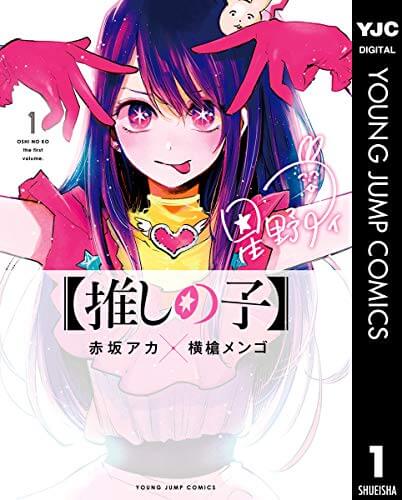
Oshi no Ko (the literal title translates to My Idol’s Child) is a manga that’s been making lots of waves since its 2020 debut, especially after the release of its anime adaptation in Spring 2023. The theme song, Idol, sung by YOASOBI, has also topped the charts with its clever lyrics and fantastic arrangement.
I cannot recommend Oshi no Ko enough: It combines a sensational premise, the dark underbelly of the entertainment industry, an engaging mystery, and interesting, multifaceted characters with gorgeous art.
However, the Japanese level is most suitable for advanced learners due to the use of entertainment industry vocabulary, internet slang, and the lack of furigana.
Oshi no Ko has 12 volumes and is ongoing.
Advanced Japanese Manga // キングダム / Kingdom
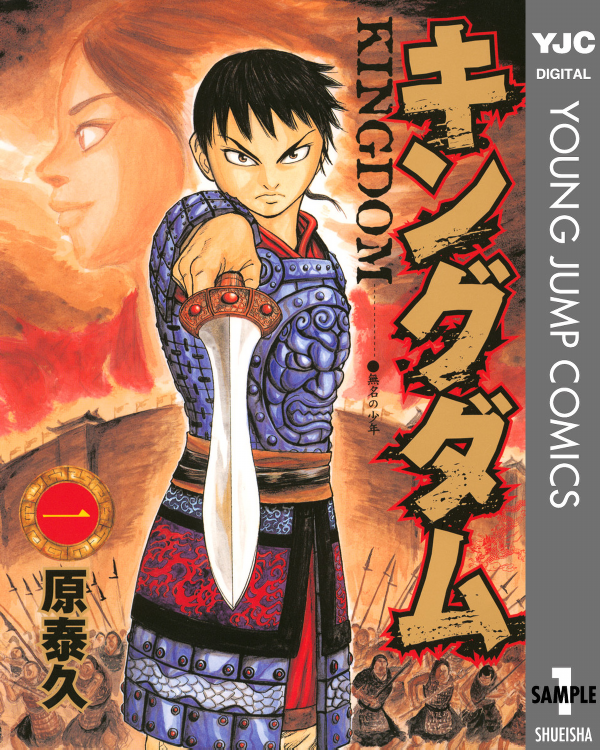
The final recommendation in this list is Kingdom, which is a beast of a series.
As of July 2023, it has a whopping 69 tankōbon volumes!
Set in the Warring States period in China (~745 BC-221 BC), Kingdom follows the protagonist, war orphan Shin, as he fights in numerous battles and wars to become the greatest general under the heavens.
In the process, Shin befriends the ousted king of Qin, named Sei, who dreams of uniting the disparate states of the Warring States period into one kingdom under the flag of Qin.
Kingdom is a difficult manga to read, even for advanced learners: It uses a great deal of vocabulary related to war and its Chinese historical setting.
In addition, its setting is not for the faint of heart: Since it’s a war manga, there is lots of blood and death.
Despite this, I highly recommend it. It’s truly an epic and has spawned 4 seasons of anime (129 episodes), 2 live-action films, and has sold over 99 million copies!
👉 If you enjoyed this article, make sure to check out our latest content:
- Coffee in Japanese // A Complete Guide to Ordering WITH Audio
- Basic Phrases in Japanese // Learn 32 Essential Phrases (With Flashcards & FREE Quiz)
- How to Say Thank You in Japanese: From Anime Slang to Formal Expressions
- From Kirei to Uruwashii: How to Say Beautiful in Japanese
- Express Your Love 💖 How to Say I Love You in Japanese
Japanese Manga // FAQ’s
What is Japanese manga?
Manga (漫画・まんが) is the word used in Japanese to refer to Japanese-style comic books, which use a monochrome color scheme and are often the reference material for popular anime series.
Why should I read Japanese manga?
It can be a fun, accessible way to break into Japanese media without feeling overwhelmed. There is often furigana (the phonetic reading of kanji, or Chinese characters used in Japanese writing) and the grammar is typically JLPT N5-N4.
How much Japanese do I need to know to start reading manga?
At least the basic grammar and vocabulary, such as what’s taught in LTL’s A1 and A2 classes.
Where can I read Japanese manga?
In the modern age, the options are always expanding. Some of our favorite sites and platforms include Bookwalker, eBookJapan, and Comic Walker. Many bookshops now also feature a manga section and depending on your area, you may have a Japanese bookshop dedicated just to manga!
What Japanese manga do you recommend for beginners?
I Fell in Love After School, Shikimori-san Isn’t Just a Cutie, and Flying Witch are all great choices!
What Japanese manga do you recommend for intermediate learners?
If you want more of a challenge, Horimiya, Natsume’s Book of Friends, and The Way of the Househusband are all fun and will teach you a variety of interesting vocabulary and slang, as well as important cultural information.
What Japanese manga do you recommend for advanced learners?
For advanced learners, Oshi no Ko, Silver Spoon, and Kingdom will really push you to your limits and introduce you to exciting stories, new kanji, and uncommon vocabulary.
Want More From LTL?
WANT TO LEARN JAPANESE? Check out our online Japanese courses here.
We offer a 7-day free trial to all new students where you can study 24/7.
What about studying Japanese in Japan instead? We’ve got your back. Our Japanese courses in Tokyo can either be taken in small groups of no more than 5 students or individually for a more tailored experience.
We even offer incredible homestay experiences in Tokyo as well.
Come and be a part of this amazing community.










![LTL Flexi Classes // How To Learn Japanese, Korean & Chinese [SAME TIME]](https://i3.ytimg.com/vi/6AxkGHuikJM/hqdefault.jpg)
